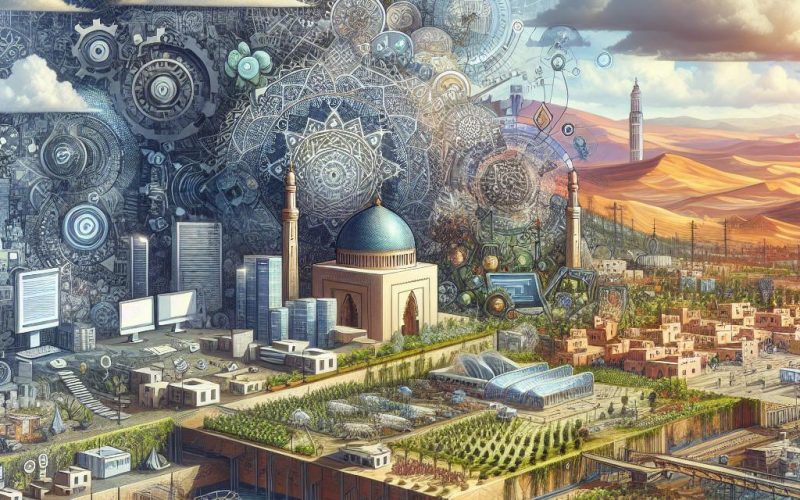as the sun rises over the bustling markets and vibrant streets of Morocco, a digital revolution quietly unfolds beneath the surface. Now, more than ever, consumers are embracing the convenience of online transactions, reshaping the landscape of commerce in this culturally rich nation. With mobile wallets, e-commerce platforms, and cryptocurrencies gaining traction, the future of digital payments is set to transform how Moroccan businesses and consumers interact. In this article, we delve into the emerging trends, innovative solutions, and unique challenges that define the evolution of digital payments for websites across Morocco, exploring how they promise to redefine accessibility, security, and growth in the digital economy. Join us on this journey as we unveil the potential of a cashless society in a land where tradition meets technology.
Morocco is experiencing a profound transformation as digital payment solutions continue to alter how consumers and businesses engage with each other. As the penetration of smartphones rises, mobile technology is increasingly being harnessed to streamline the user experience in online transactions. This trend is evident as businesses adopt mobile-optimized payment gateways that allow instant transactions, real-time updates, and a seamless checkout process. By integrating mobile wallets such as HPS, Payzone, and InwiMoney, e-commerce platforms can cater to the growing number of consumers who prefer using their smartphones for everyday purchases. The focus on enhancing user experience not only facilitates increased transaction volumes but also fosters brand loyalty among tech-savvy Moroccan consumers.
Security concerns remain a significant barrier to widespread adoption of digital payment methods among Moroccan consumers. To build trust, e-commerce businesses must prioritize robust security measures, such as end-to-end encryption, multifactor authentication, and fraud detection systems. Consumers are more likely to engage in online transactions if they feel confident that their sensitive data is protected. Moreover, businesses should regularly educate their customers on safe online practices and the security features of their payment systems. To stay ahead of the competition, Moroccan e-commerce businesses should consider adopting the latest technologies, such as blockchain and AI-driven analytics, to enhance both transactional security and operational efficiency. A commitment to openness and continuous innovation will ensure a thriving digital payment ecosystem.
Q&A
Q&A: The Future of Digital Payments for Websites in Morocco
Q: What are digital payments, and why are they significant for websites in Morocco?
A: Digital payments refer to transactions made electronically, rather than through cash or checks. In Morocco, where internet connectivity is on the rise, the meaning of digital payments is profound. They facilitate smoother online transactions, support e-commerce growth, and enable businesses to tap into both local and global markets, thereby transforming the way Moroccans engage in commerce.
Q: How is the Moroccan government supporting the growth of digital payments?
A: the Moroccan government has been proactive in fostering a favorable environment for digital payments. Initiatives include regulatory frameworks that encourage fintech innovation, partnerships with banks to enhance payment infrastructure, and awareness campaigns aimed at educating citizens on the benefits and safety of digital transactions. These measures aim to create a more inclusive economy where everyone can participate.
Q: What challenges do businesses face when adopting digital payment solutions?
A: Despite the promising outlook, businesses in Morocco often grapple with several challenges when adopting digital payment solutions. These include limited access to reliable internet, concerns over cybersecurity, and the need for payment processors that cater to local preferences. additionally, many small businesses may lack the technical knowledge or resources to implement these systems effectively.
Q: How do consumer preferences impact the future of digital payments in Morocco?
A: Consumer preferences play a pivotal role in shaping the future of digital payments. As Moroccans become more familiar with technology and digital payment platforms, their expectations will drive innovation. Trends suggest a growing inclination toward mobile payments and e-wallets, reflecting a broader global shift. Merchants that can adapt to these preferences will likely thrive, while those that resist change may struggle.
Q: Are there any emerging technologies that could influence digital payments in Morocco?
A: Yes,several emerging technologies stand to influence the landscape of digital payments in Morocco. Blockchain technology, for instance, offers enhanced security and transparency in transactions. Additionally, advancements in Artificial Intelligence and data analytics can streamline payment processes and improve fraud detection, making digital payments safer and more efficient.
Q: What role do fintech companies play in this evolution?
A: Fintech companies are at the forefront of the digital payment revolution in Morocco. They are driving innovation by offering diverse payment platforms, simplifying transaction processes, and providing alternatives to traditional banking systems. These companies often emphasize user-friendly experiences and tailored solutions for different sectors, making them key players in shaping the future of digital payments in the country.
Q: What can we expect for the future of digital payments in Morocco?
A: The future of digital payments in Morocco looks promising. With continuous advancements in technology,increasing smartphone penetration,and a growing digital-savvy population,we can anticipate a robust ecosystem for online transactions. The integration of various payment options and the push towards financial inclusion will likely create a seamless experience for consumers and businesses alike, paving the way for a more digitally engaged economy.
Q: How can consumers ensure their safety while using digital payment methods in Morocco?
A: Consumers can enhance their safety by following best practices such as using reputable payment platforms, regularly monitoring their accounts for unauthorized transactions, employing strong passwords, and utilizing two-factor authentication when available. Being educated about potential scams and understanding the privacy policies of payment providers are also crucial steps towards secure online transactions.
Q: Any final thoughts on the evolution of digital payments in Morocco?
A: The evolution of digital payments in Morocco represents a significant leap towards modernization and economic advancement. As stakeholders from the government, fintech sectors, and consumers collaborate, we can expect innovative solutions that cater to a rapidly changing landscape. embracing these changes will not only enhance convenience and efficiency but also encourage greater participation in the digital economy, which is essential for Morocco’s growth in the 21st century.
The Way Forward
As we stand at the crossroads of innovation and tradition, the future of digital payments in Morocco is poised for transformation. The evolution of technology, coupled with a young, tech-savvy population, sets the stage for a payment landscape that is not only efficient but also inclusive. As businesses and consumers alike adapt to new tools and platforms, the potential for growth in e-commerce is immense.
Embracing digital payments means more than just convenience; it signifies a shift towards a cashless society, empowering individuals and businesses to thrive in the digital age. However, as we navigate this exciting terrain, stakeholders must remain vigilant about security, accessibility, and user experience to ensure that no one is left behind.
Ultimately,the journey toward a fluid and robust digital payment ecosystem in Morocco is just beginning. With collaboration between government, private sectors, and technology providers, the dream of seamless transactions could soon become a reality. As we look ahead, the question isn’t whether digital payments will flourish in Morocco, but rather how they will reshape the very fabric of commerce in the years to come. The future shines luminous, and it beckons us all to take part in this digital renaissance.












